Hurricanes increase insurance fraud potential
RICHMOND, Va. — Hurricane Sandy is being referred to by some forecasters as the “perfect storm,” but the perfect storm may be brewing for cheats and fraudsters to take advantage of Virginia citizens who suffer losses as a result of the storm.
By taking a few simple precautions to guard against the fraudsters, cheaters and crooks who often show up ready to take advantage of someone else’s misfortune, citizens can protect themselves from becoming victims of insurance fraud scams or committing insurance fraud themselves.
- Work with your insurance company to make sure all of the work being done to your property or vehicle is approved and will be covered by your insurance. Be wary of unscrupulous contractors and mechanics who promise to take care of your deductible and handle all of your insurance paperwork.
- Always use a licensed contractor. All contractors in Virginia must be licensed, bonded and carry insurance coverage for work over $1,000. This includes out-of-state contractors who are working in Virginia. To find out if a contractor is licensed or to report an unlicensed contractor, contact the Virginia Department of Professional and Occupational Regulation. Click on dpor.virginia.gov or call (804) 367-8504.
- If possible, get more than one estimate and make sure the estimates are in writing.
- Get references and check them out.
- Avoid contractors, repairmen and mechanics who use high-pressure tactics, have overly-friendly sales pitches or make offers that seem too good to be true.
- Ask to see the contractor’s driver’s license. Write down his driver’s license number as well as his vehicle’s license number.
- Never pay a contractor in full before the work is completed; don’t pay in cash; and never sign a blank contract. Make sure you understand all of the contract terms.
- Educate yourself. Become familiar with your homeowner, renter or vehicle insurance policies to understand what is covered and the amount of your deductible.
- Claim only those damages that are a result of the incident. Don’t include previous damage from an unrelated incident as part of your claim.
- Don’t inflate the value of your claim to cover your deductible or past premiums.
- Don’t fall victim to the mindset of “everyone’s doing it” and submit a false or inflated claim thinking
you’ll make a little extra money as well. - For the future, make an inventory of your household items and keep it in a secure location, preferably off-site. If possible, keep your receipts or proofs-of-purchase for big ticket items, such as jewelry, televisions or cameras in that same location. Free home inventory software can be downloaded from the Insurance Information Institute at iii.org.
- For more information about disaster fraud and to stay informed about ongoing conditions, go to vaemergency.gov/ReadyVirginia or fema.gov.
Insurance fraud costs Virginians more than $200 a year in increased premiums and increases the costs of everyday purchases by $200 to $1,000 a year. On a national level the effects of insurance fraud are estimated to cost more than $80 billion a year.
If you have knowledge of a fraudulent insurance scheme or suspect you may have been the victim of insurance fraud, report the activity to Virginia State Police Insurance Fraud Program on the insurance fraud hotline at 1-877-62FRAUD (1-877-623-7283) or visit www.stampoutfraud.com. You may remain anonymous. If your information leads to an arrest, you may also be eligible to receive a reward of up to $25,000 – just mention the reward when reporting suspected insurance fraud.
